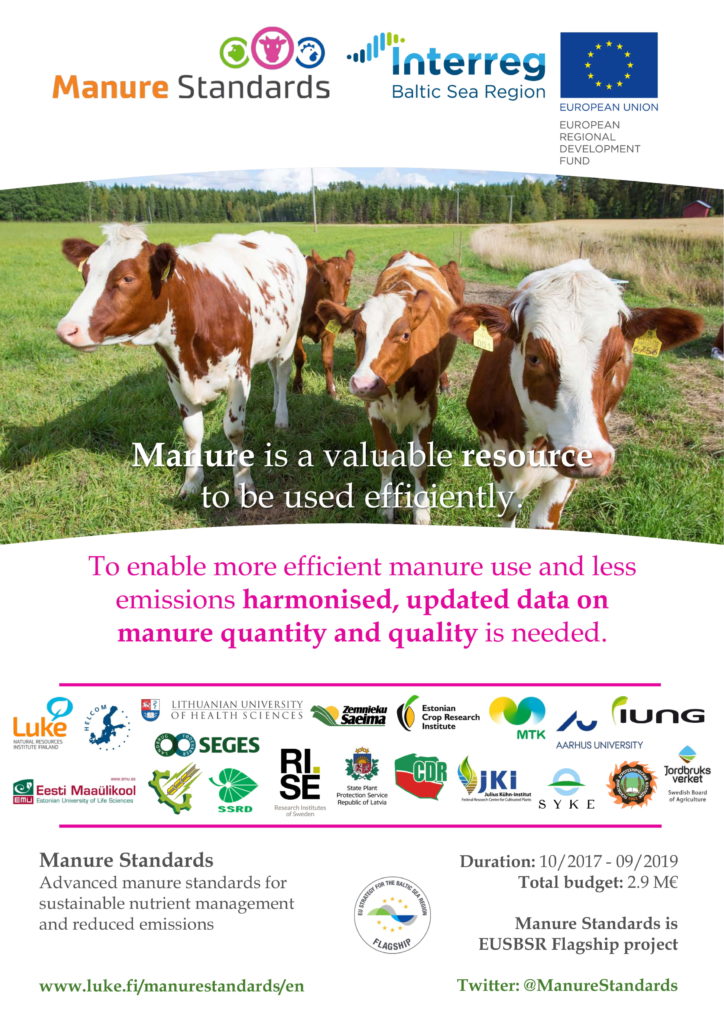Manure Standards
Improved manure standards for sustainable nutrient management and emission reduction (Advanced manure standards for sustainable nutrient management and reduced emissions)
Project designation: Manure standards (MANURE STANDARDS)
Project number: #R057
Program: European Structural and Investment Programme for the Baltic Sea Region 2014-2020
Priority: 2. Effective management of natural resources
Specific objective: 2.1 Clean waters: Increase the efficiency of water management to reduce the input of nutrients and hazardous substances into the Baltic Sea and its regional waters
Manure is a valuable source of plant nutrients and organic matter, but agricultural activities result in high levels of nutrient emissions into the Baltic Sea. The largest nutrient emissions are from the use of manure. This is particularly pronounced in regions with a high proportion of farm animals. Therefore, it is necessary to improve the use of manure.
Policymakers, monitoring institutions, farmers and consultants lack uniform standards for assessing the quantity and quality of manure, calculating its mass and nutrient losses and emissions, which would ensure a uniform manure use system in all Baltic Sea region countries and make a significant contribution to effective nutrient management and sustainable manure use.
The main goal of the project is to create a new, internationally uniform manure management system, with the help of which the project target groups (farmers, consultants, policymakers and monitoring authorities) will be able to improve practical manure use and provide reliable and comparable data to policymakers.
The developed manure standards will allow determining the quantity and quality of manure.
They will contain:
- uniform guidelines for manure sampling, analysis and data collection for manure management;
- uniform guidelines and an Excel program for a farm animal-based calculation system.
Additionally, recommendations for unified manure management will be developed.
In general, the project will:
- a unified manure management system has been developed, which will be tested on pilot farms;
- the environmental and economic impact of the developed management system has been assessed both in pilot farms and at the national and international levels;
- clear guidelines for the use and storage of manure have been developed, identifying the needs of manure management systems and policy makers;
- recommended necessary actions for the practical implementation of a manure management system.
All project activities will be carried out in close cooperation between project partners and associated organizations, scientists, farmers, agricultural advisors and policy makers, taking into account the needs of all target groups.
The guidelines will be published in English and national languages and disseminated through seminars, events, articles, social media and the internet. The sampling guidelines will be complemented by explanatory video materials.
International recognition of a unified manure management system will allow for improved accuracy in manure use, thereby ensuring the rational use of plant nutrients and reducing their emissions into the Baltic Sea, while ensuring the economic efficiency of manure use.
Project partners:
19 project partners and 32 associated organizations from 9 Baltic Sea region countries
Project partners from Latvia: State Plant Protection Service and the Association "Farmers' Council"
Project implementation period: 01.10.2017.-30.09.2019. (24 months)
Project budget: The project is co-financed by the ERDF.
Following the project on its website: https://www.luke.fi/manurestandards/en/frontpage/
or on Twitter: https://twitter.com/ManureStandards
LLU RESEARCH: ENVIRONMENTAL IMPACT ASSESSMENT OF MANURE MANAGEMENT SYSTEMS IN THE CONTEXT OF INTEGRATED NITROGEN MANAGEMENT
LLKC STUDY: Feed intake and nitrogen emissions
Guide to good manure management practices: MANUAL




